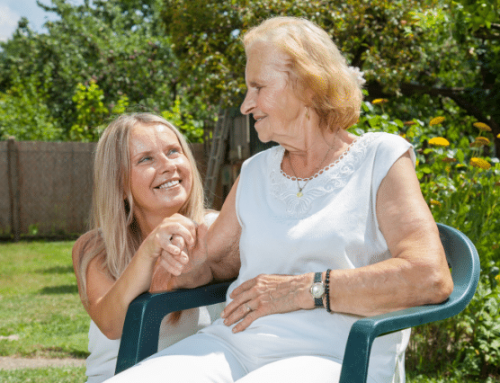
15 Ways to Inspire and Encourage Seniors with a Terminal Condition
It can be difficult to know how to support a loved one with a terminal illness, but it is important to remember that having an encouraging, positive outlook can make a world of difference. This blog post will provide 15 practical ways to empower and motivate seniors with a terminal illness, enabling them to stay positive and remain in control of their lives during this trying time. Whether it’s helping them find meaningful activities or providing emotional support, these tips are sure to help you offer the best possible care and guidance.
Provide emotional support and guidance
Providing emotional support to a person with a terminal illness means being there for them in both big and small ways. It involves listening to their thoughts and feelings without judgment, validating their emotions and reassuring them that you are there for them no matter what. It also involves engaging in meaningful conversations with them and providing comfort during difficult times. Acknowledging the individual’s concerns can help to provide emotional support by helping the person feel heard, respected and understood. Being an emotional anchor for someone in this situation can be beneficial for both parties involved; it allows the senior with a terminal illness to receive much needed support while also giving an outlet for family members or friends to express their own feelings during this difficult time.
Promote realistic expectations
When caring for seniors with a terminal illness, it is important to be realistic about the situation. It is natural for seniors and their families to want to make the best of this difficult situation, but setting unrealistic expectations may only serve to frustrate them further. Instead, seniors should be encouraged and reminded that they are still in control of their lives – that their illness does not have to define them. It’s important to focus on the positive aspects of life and do what you can to promote a sense of peace and security. This includes avoiding topics or pressures that may cause seniors more stress, such as discussing long-term care plans or end-of-life issues.
Encourage independence
Enabling seniors with a terminal illness to remain as independent as possible is key in helping them remain motivated. This can be done through activities such as light exercise and leisurely hobbies, as well as by providing resources for seniors to complete tasks independently (such as an in-home caregiver). Allowing seniors to take part in activities that keep their minds and bodies active can help to promote a sense of purpose, self-respect and autonomy. It is also important to respect seniors’ decisions; giving seniors the power to make their own choices and allowing them to complete tasks on their own can be empowering and motivating for seniors with terminal illnesses.
Create meaningful experiences
Find ways to make each day special, such as planning activities or outings that give seniors something new to look forward to each day. This could include visiting local attractions, going on trips or even engaging in simple activities such as playing cards or watching a movie. Creating these experiences can not only be enjoyable, but they also give seniors something to look forward to and can provide an opportunity for seniors to interact with others and stay connected.
Practice self-care
Encourage seniors to take care of themselves both physically and mentally while facing a terminal illness. Suggest activities such as stretching, safe exercise, mindful meditation or art therapy that may provide some relief from stress and anxiety symptoms associated with terminal illness. Additionally, seniors should be encouraged to talk with a trusted friend or mental health professional about the emotional struggles they may face during this time.
Develop positive routines
Creating and maintaining a routine can be an effective way for seniors to motivate themselves and remain focused on their daily activities. This doesn’t need to be a strict schedule, but rather a few basic tasks that seniors can complete each day. These tasks could include light exercise, journaling or reading; the goal is to provide structure without being too demanding.
Cultivate social connections
It is important for seniors to stay connected with others while managing a terminal illness. Encourage seniors to reach out to family and friends, attend group activities or even join online support groups; this can provide seniors with social outlets where they can receive additional emotional support.
Seek out resources
Research supportive organizations or online communities specifically designed to offer assistance, advice, education and resources related to managing a terminal illness .
Prioritize health
Urge seniors to stay consistent with medical treatments while making sure they stay comfortable at all times by utilizing complementary therapies when appropriate. This can include massage, aromatherapy or mindfulness-based therapies. Consulting a physician and setting up a supportive care plan can help seniors feel more at ease and provide some reassurance.
Connect with nature
Find moments throughout the day that help connect people with nature like walking outdoors or laying in the sun for a few minutes if able. This can be calming, therapeutic and inspiring for seniors.
Make memories
Capture memories during this difficult time through photos and videos or written stories so that seniors have something tangible that can be shared among family members now and in the future.
Address spiritual needs
Discuss seniors’ spiritual needs with them and provide support. Attend church services, practice prayer or meditation together or find other ways that seniors can connect with their spiritual side while managing a terminal illness.
Show compassion
Showing kindness towards those dealing with a terminal illness is essential; find ways of expressing love without saying too much by providing small gifts like flowers or meaningful keepsakes like jewelry or artwork.
Create legacies
Encourage seniors to create a legacy of their own by writing letters or sharing stories that contain valuable life lessons. This is a great way for seniors to leave behind something special for future generations and it can also provide seniors with a sense of purpose as they navigate through this difficult time. Recording audio messages or creating photo albums filled with special moments spent together can also be meaningful.
Partner with In-Home Caregivers
When it comes to seniors with a terminal illness, having an in-home caregiver can make a world of difference. An in-home caregiver provides seniors with the necessary guidance and support they need to remain comfortable and independent for as long as possible. In addition to providing practical assistance, such as helping seniors with daily tasks or offering emotional support. Caregivers also provide companionship that seniors may not have otherwise. Caregivers can also provide seniors with a sense of control over their own lives, which is incredibly empowering during this difficult time.
Caring for a senior with a terminal illness can be emotionally taxing, but it is important to remember that our presence and willingness to support through practical and emotional means can make a difference. At the end of the day, it’s crucial to create positive and memorable experiences for seniors, celebrating every moment you share with them. We hope that the tips we’ve provided will guide you in supporting and empowering seniors during their terminal illness journey.
We encourage you to take the time to apply these tips and share this article with others in your community who may be going through similar experiences. Should you need assistance with an in-home caregiver, please contact us today at (678) 494-8129 or drop us an email at info@SilverCompanions.com. Our team at Silver Companions is here to help seniors and their loved ones manage terminal illnesses as comfortably and independently as possible. We provide highly trained caregivers who are dedicated to helping seniors maintain a high quality of life during this difficult time. Together, we can make a positive impact on the lives of seniors with a terminal illness.





